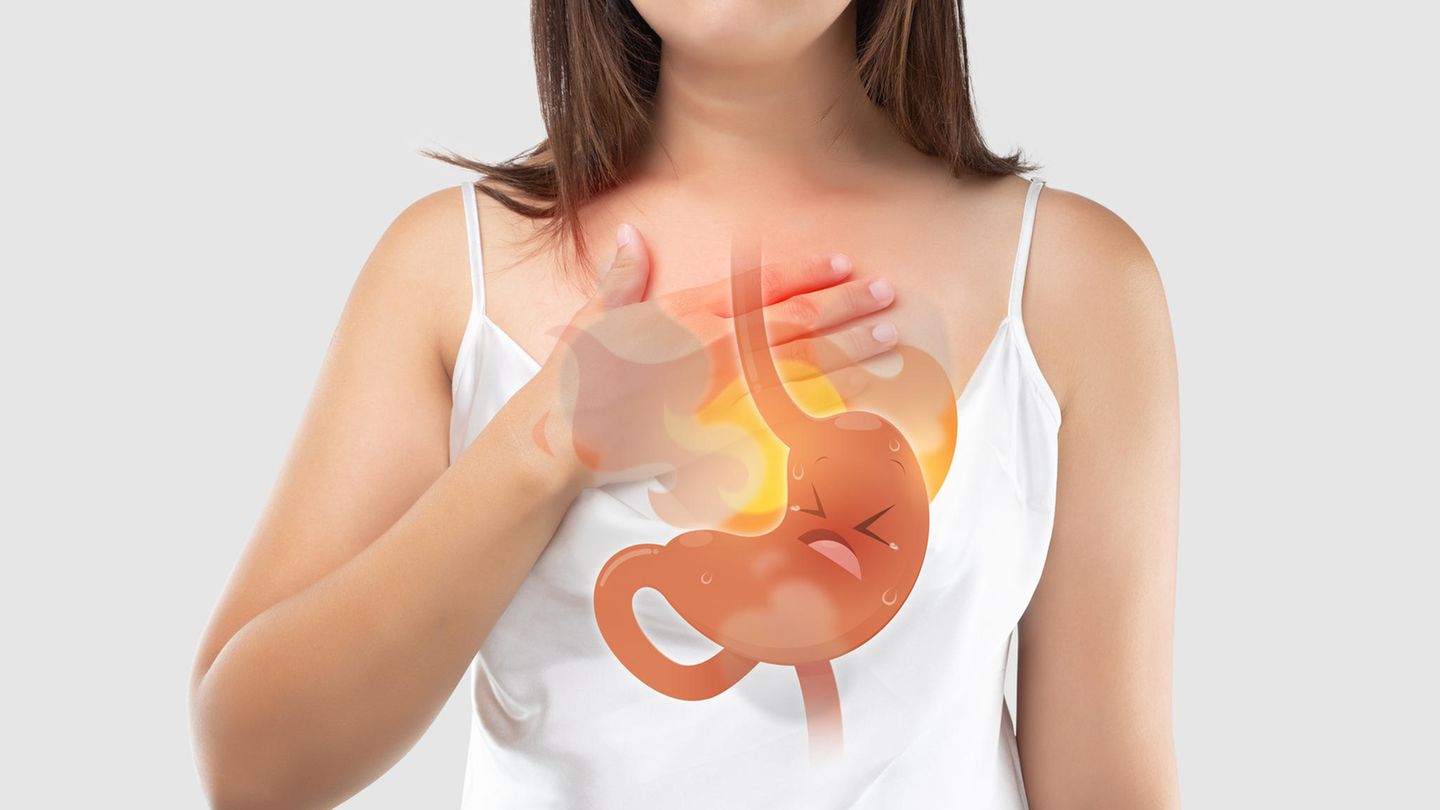Achalasia is a rare disease of the esophagus that causes serious health problems. A 39-year-old woman from England waited 13 months to be diagnosed. She was unable to hold solid food and was vomiting all the time.
This article first appeared on RTL.de.
Sally Walker, 39, from London suffers from achalasia – a rare disease that causes the stomach to close. This means that Sally’s esophageal sphincter does not open properly and the mobility of the muscles is disturbed. Sally couldn’t swallow solid food or water. And if she ingested something, she immediately vomits it up again. For months, her doctors couldn’t find a cause for her suffering. Sally is artificially fed through a tube the whole time, people on the street are staring at her. Because her illness was diagnosed so late and Sally suffered a lot from the reactions of other people, she now wants to share her experiences and is fighting for more awareness of this rare disease.
People laugh at them
Because Sally is artificially fed through a nasogastric tube that she has to wear permanently, people on the street stare at her, some even laugh at her. For Sally these reactions are almost as bad as the illness itself. She suffers a lot from the constant gazes when she leaves the house. A behavior that Sally cannot understand: “I know it is not always her fault, but if you are the one who has to endure it, you just want to tell people: Just ask me what I have!”
Sally’s health continues to deteriorate
Her health problems started in June 2020 when she had trouble keeping food down: “Whenever I ate something, a sandwich or something, it felt like it got stuck in my throat and I had to choke up again. (…) I knew something was wrong, but I couldn’t exactly say what. “
Her doctor sent her to the hospital to have a barium test (barium ingestion makes the food visible on X-rays when you chew and swallow it, so the doctor can see the food on its way from the mouth to the esophagus and from there into the stomach, identifying problems affecting the swallowing process).
During the test, the doctors found that Sally’s esophagus was not working properly. Her condition got worse and worse, and she became very sick. Due to the corona pandemic, she also had to wait a long time for doctor’s appointments. Ear, nose and throat specialists called in could not help Sally either. At Christmas last year she had reached a low point – she no longer knew what to do.
Sally is artificially fed for 13 months
Because she can no longer keep anything to herself – not even liquid food – she loses a lot of weight. Her last real meal – pasta – was in February. But even after that, she spent two days vomiting.
Completely dehydrated and at the end of her strength, she is hospitalized and now has to be fed artificially through a gastric tube. She wears them for a total of 13 months – the probe is changed six times during this time. An ordeal for the sporty Sally, who cannot practice her sports Crossfit and Boxfit with the tube as she is used to. If she shows up with the tube in her nose while exercising, people stare at her again. But despite everything, the training helps her to reduce her psychological and physical stress.
Finally the diagnosis: achalasia
In May, Sally was diagnosed with achalasia after another test at Guy’s Hospital in London. The manometry test examines whether the esophagus is able to carry food normally into the stomach. If it is unable to do this, it is a sign of the rare disease achalasia. On the one hand Sally is happy that she finally has a diagnosis, but on the other hand she is also frustrated that it took months to get it: “A tube is put through the nose and throat and you drink a few sips of water. I had a diagnosis within 10 seconds. It’s insanely frustrating that this diagnosis was made so late! “
Within a very short time Sally gets an appointment for the surgery. On June 29, she had a peroral endoscopic myotomy – a minimally invasive surgical procedure that allows food and fluids to enter the stomach again.
Step by step back to normal
Sally then spends two days in the hospital. She can again keep liquid foods, shakes, soups, yogurt and a little fruit with her. The 39-year-old is now working step by step to ensure that she can eat all the food that she has missed so much in the past year and that she can lead a normal life with her daughter and her partner again.
The reactions of other people to the sight of her were very stressful for Sally. But she also received a lot of support. She found a support group online, people who had experiences similar to hers.
Many want to know from her how she was diagnosed because they no longer know what to do. Because achalasia is so rare, the symptoms – especially in women – are often misinterpreted and attributed to stress or eating disorders.
Sally speaks openly about her experience because she wants to draw attention to the disease so that other sufferers can be helped more quickly. And appeal to those who are not affected to react more emphatically to the needs of others, instead of making fun of them and thus making their suffering even worse.
See in the video: The pregnancy triggered a rare but dangerous disease in 45-year-old Lindsay Peterson: peripartum cardiomyopathy. Find out in the video how her husband saved her life and how you can recognize the disease.




